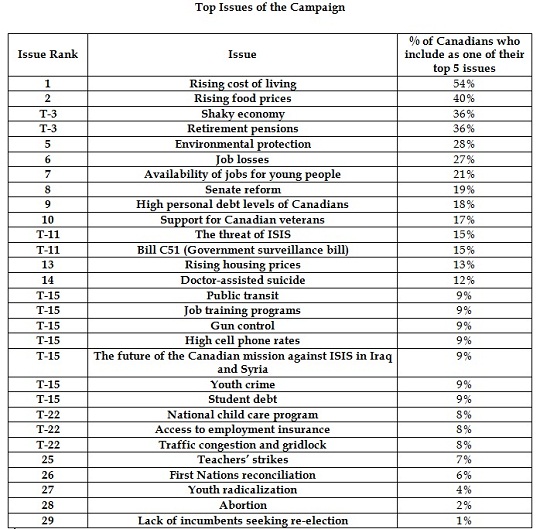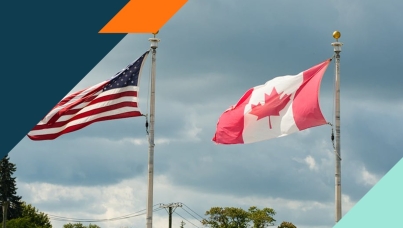What Canadians Want the Party Leaders to Talk About During the Election Campaign: Issues that Matter to them Personally
The number one issue that Canadians say they want the party leaders to talk about during the election campaign is the `rising cost of living' (54%).
In second place, and related, is `rising food prices' (40%) and rounding out the top five issues are both the `shaky economy' (36%) and `retirement pensions'(36%) tied for third (and fourth) place with `environmental protection'(28%) in fifth place.
With four out of the top-five issues relating to the pocketbook it will set up an interesting dichotomy between the Conservatives and the NDP. The Tories have historically had the advantage on economic matters, while the NDP has typically had the advantage on issues of affordability. The environment is also a weak spot for the Harper Conservatives with the NDP and Liberals likely having the advantage on this issue.
Issues six and seven are squarely economic: `job losses' (27%) and `the availability of jobs for young people' (21%). With so much attention paid to the Senate, it's no surprise that `senate reform' (19%) is ranked in the top 10 at 8th followed by the final two of `high personal debt levels of Canadians' (18%) and `support for Canadian veterans' (17%).
The full list of issues and the proportion of Canadians who chose each issue to be among their top 5 issues of the campaign is listed below:
The data reveal that the order of the top five issues changes among supporters of the different parties:
- Among Conservative supporters, the top five issues are: the rising cost of living (55%) the shaky economy (42%), retirement pensions (38%), rising food prices (35%) and senate reform (27%).
- Among NDP voters, the top five issues are: the rising cost of living (55%), rising food prices (42%), the shaky economy (42%), environmental protection (39%) and retirement pensions (33%).
- Among Liberal voters, the top five uses are: the rising cost of living (52%), retirement pensions (40%), rising food prices (36%), the shaky economy (35%) and environmental protection (32%).
- Among Bloc voters, the top five issues are: the rising cost of living (55%), rising food prices (43%), job losses (30%), the shaky economy (28%) and environmental protection (28%).
The ranking of issues fluctuates as well among key demographic constituencies that the parties will be attempting to woo:
- Among men, the top five issues are: the rising cost of living (47%), the shaky economy (38%), rising food prices (35%), retirement pensions (32%) and job losses (28%).
- Among women, the top five issues are: the rising cost of living (61%), rising food prices (44%), retirement pensions (40%), the shaky economy (35%) and environmental protection (29%).
- Among those aged 18 to 34, the top five issues are: the rising cost of living (50%), job losses (33%), rising food prices (28%), environmental protection (28%), and student debt (25%).
- Among those aged 35 to 54, the top five issues are: the rising cost of living (61%), rising food prices (44%), the shaky economy (34%), retirement pensions (33%) and job losses (32%).
- Among those aged 55+, perhaps the most important voting demographic given their high turnout rates, the top five issues are: the rising cost of living (50%), retirement pensions (48%), the shaky economy (45%), rising food prices (41%) and senate reform (32%).
- Among those with a household income of less than $40,000, the top five issues are: the rising cost of living (57%), rising food prices (46%), retirement pensions (30%), job losses (30%) and the shaky economy (29%).
- Among those with a household income of $40,000 to just under $60,000, the top five issues are: the rising cost of living (58%), rising food prices (43%), retirement pensions (41%), the shaky economy (33%) and job losses (27%).
- Among those with a household income of $60,000 to just under $100,000, the top five issue are: the rising cost of living (52%), the shaky economy (43%), retirement pensions (38%), rising food prices (37%) and environmental protection (30%).
- Among those with a household income of $100,000 or more, the top five issues are: the rising cost of living (47%), the shaky economy (42%), retirement pensions (37%), environmental protection (31%) and rising food prices (27%).
These are some of the findings of an Ipsos poll conducted between July 23rd and 27th, 2015 on behalf of Global News. For this survey, a sample of 2,000 Canadians (including 1,571 decided voters) from Ipsos' Canadian online panel was interviewed online. Weighting was then employed to balance demographics to ensure that the sample's composition reflects that of the adult population according to Census data and to provide results intended to approximate the sample universe. The precision of Ipsos online polls is measured using a credibility interval. In this case, the poll is accurate to within +/ - 2.5 percentage points, 19 times out of 20, had all Canadian adults been polled. The credibility interval will be wider among subsets of the population. All sample surveys and polls may be subject to other sources of error, including, but not limited to coverage error, and measurement error.
For more information on this news release, please contact:
Darrell Bricker, PhD
CEO
Ipsos Global Public Affairs
(416) 324-2001
[email protected]
About Ipsos in Canada
Ipsos is Canada's market intelligence leader, the country's leading provider of public opinion research, and research partner for loyalty and forecasting and modelling insights. With operations in eight cities, Ipsos employs more than 600 research professionals and support staff in Canada. The company has the biggest network of telephone call centres in the country, as well as the largest pre-recruited household and online panels. Ipsos' marketing research and public affairs practices offer the premier suite of research vehicles in Canada, all of which provide clients with actionable and relevant information. Staffed with seasoned research consultants with extensive industry-specific backgrounds, Ipsos offers syndicated information or custom solutions across key sectors of the Canadian economy, including consumer packaged goods, financial services, automotive, retail, and technology & telecommunications. Ipsos is an Ipsos company, a leading global survey-based market research group.
To learn more, please visit www.ipsos.ca.
About Ipsos
Ipsos is an independent market research company controlled and managed by research professionals. Founded in France in 1975, Ipsos has grown into a worldwide research group with a strong presence in all key markets. Ipsos ranks third in the global research industry.
With offices in 86 countries, Ipsos delivers insightful expertise across six research specializations: advertising, customer loyalty, marketing, media, public affairs research, and survey management.
Ipsos researchers assess market potential and interpret market trends. They develop and build brands. They help clients build long-term relationships with their customers. They test advertising and study audience responses to various media and they measure public opinion around the globe.
Ipsos has been listed on the Paris Stock Exchange since 1999 and generated global revenues of e1,669.5 ($2,218.4 million) in 2014.
Visit www.ipsos.com to learn more about Ipsos' offerings and capabilities.




